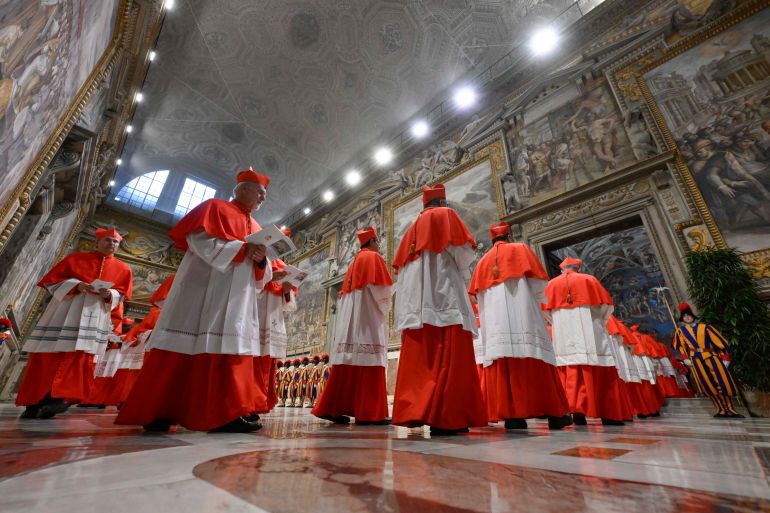As the conclave gathers, let debt justice be Pope Francis’s legacy
Honour Francis’s vision for 2025 by cancelling unjust debts and funding climate action in the Global South.
Published On 8 May 20258 May 2025

Pope Francis was never drawn to pomp or grandeur. He asked to be buried in a simple casket, and his burial was held not in the ornate halls of the Vatican, but in a modest neighbourhood church, true to his lifelong humility. As a conclave gathers today to choose his successor, world leaders and faith communities are reflecting on how best to carry forward his legacy. Francis would not have wanted ornate tributes or empty gestures. He would have wanted action – especially in the form of debt cancellation for developing countries and a renewed commitment to climate justice.
Francis envisioned 2025, a Jubilee year for the Catholic Church, as a time to restore justice – among people, between nations, and with the Earth itself. A time to wipe the slate clean and begin again, not in words but in deeds. That vision aligns closely with another urgent global imperative: 2025 is also the year by which scientists warn that global carbon emissions must peak and begin to decline if we are to avoid catastrophic climate breakdown.
Advertisement
But instead of preparing for a just transition, many of the countries most affected by climate change are caught in a worsening “climate-debt doom loop.” From cyclones in Mozambique to floods in Pakistan and prolonged droughts in Malawi, climate-related disasters – caused overwhelmingly by industrialised nations – are tearing apart the infrastructure and economies of developing countries and displacing millions of people.
Yet rather than receiving long-overdue funding and support, climate-vulnerable nations are being drained by record levels of debt payments – many owed to the very countries and institutions most responsible for global warming. According to calculations by 350.org, in 2023, developing nations spent roughly 40 times more on servicing foreign debt than they received in net climate assistance.
This is not only unjust – it’s self-defeating. Funds that should be invested in clean energy, sustainable agriculture, reforestation, flood defences and public health are instead diverted to repay wealthy creditors. Meanwhile, the escalating impacts of climate change are driving up borrowing costs, pushing vulnerable countries even deeper into debt. For every $10 spent on debt payments, an additional dollar is effectively added as a premium for climate risk.
The consequences ripple far beyond environmental damage. Debt service now consumes more government spending in many countries than healthcare and education combined. Over three billion people live in countries where more is spent on interest payments than on meeting basic human needs. This is not only economically short-sighted – it is a moral scandal.
Advertisement
Pope Francis named this reality with unflinching clarity. In his final New Year’s message, he wrote: “Foreign debt has become a means of control whereby governments and private financial institutions of the richer countries unscrupulously and indiscriminately exploit the human and natural resources of poorer countries, simply to satisfy the demands of their own markets.”
He reminded us that the financial debt of the Global South is the mirror image of the massive ecological debt the Global North owes. Research by Oxfam and others estimates that wealthy nations – responsible for more than 75 percent of historic carbon emissions – owe developing countries around $5 trillion each year in climate-related reparations. That’s a feasible figure, especially when you consider that these same wealthy governments currently spend about $7 trillion annually subsidizing fossil fuel industries.
There is precedent for bold, transformative action. In the last Jubilee year – 2000 – a global movement led by civil society and faith groups secured the cancellation of over $100bn in debt for 35 heavily indebted nations. The results were remarkable: Tanzania and Uganda eliminated primary school fees, boosting enrolment. Mozambique and others expanded access to healthcare. Several countries saw improved credit ratings and increased foreign investment.
That initiative was a recognition that economies must serve people, not the other way around. But it fell short of addressing the deeper structural flaws that enable recurring debt crises. In the years since, especially during the COVID-19 pandemic, indebtedness has surged again. Now, the combined pressure of climate impacts, declining aid and economic instability – including trade disruptions triggered by protectionist policies – threatens to unleash a global debt tsunami.
Advertisement
The poorest nations may be hit first and hardest, but this is not a crisis they face alone. A world shackled by unjust debt cannot act decisively to stop climate collapse. The debt crisis, if left unresolved, will sabotage efforts to protect people and the planet alike.
Pope Francis reminded us that forgiveness, renewal and justice are not abstract ideals. They are moral and practical imperatives in an age of ecological breakdown. As the world prepares for the next chapter of papal leadership, we must act in his spirit: by resetting the rules of a broken financial system and building one rooted in equity, solidarity and care for our common home.
The views expressed in this article are the author’s own and do not necessarily reflect Al Jazeera’s editorial stance.
